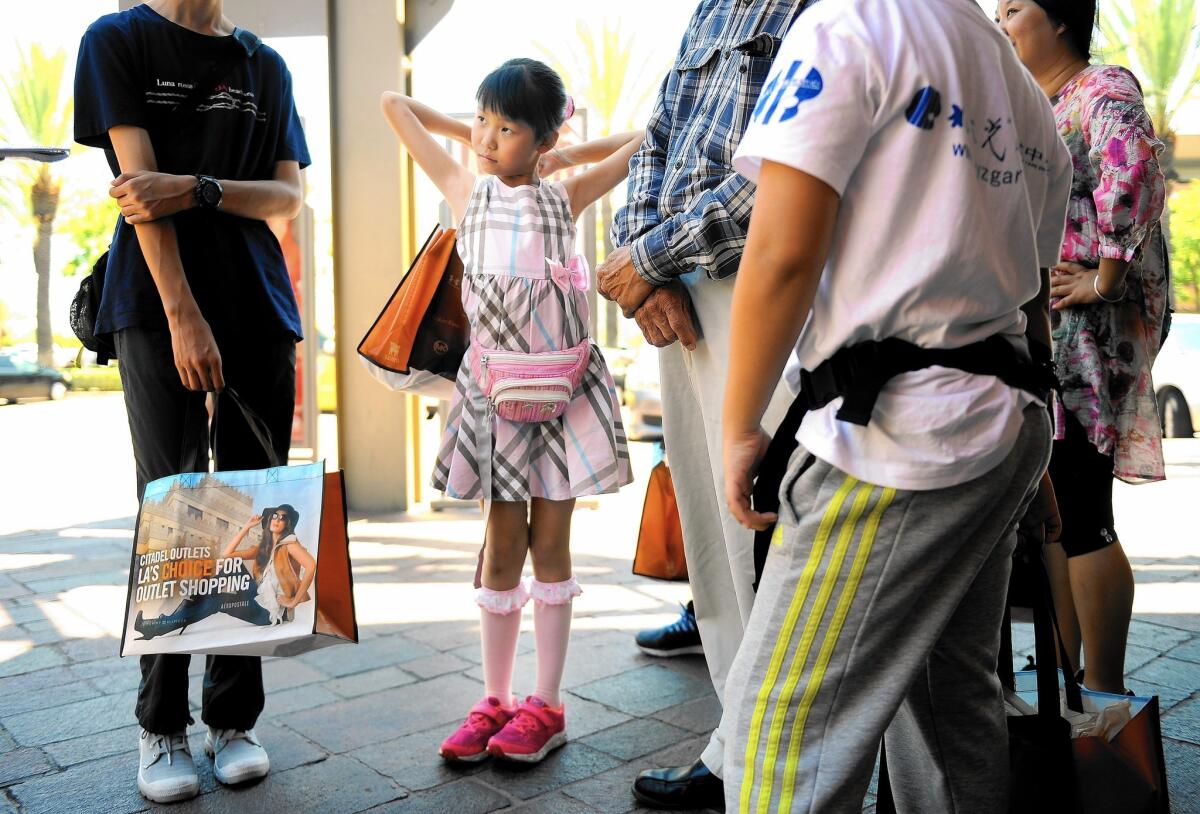California braces for falling yuan’s ripples

Tianyuan Chang, 9, and other Chinese tourists at the Citadel Outlets in Commerce on Wednesday.
At the Beverly Center on Wednesday, a clutch of Chinese tourists spilled out of a bus and into the upscale mall, ready to snap up Gucci purses and Nike sneakers.
The tour bus is just one of about 70 the shopping center gets a month, dropping off visitors from China primed to splurge — but with currency that is suddenly worth less because of the devaluation of the Chinese yuan.
These tourists are spending now, but anxiety is high throughout the Southland about whether tourists, home buyers and investors from China will lose interest if the currency keeps falling.
SIGN UP for the free California Inc. business newsletter >>
Chinese tourists “are very, very important,” said Susan Vance, the Beverly Center’s marketing and sponsorship director. “One of the things we realized … is that they like to shop.”
China’s decision to devalue the yuan, also known as the renminbi, is sure to be felt across the Southern California economy — in ways that are bad as well as good.
With so many local businesses tied to the Chinese economy — whether for tourist dollars, investment or trade — any weakening of its currency could have a swift impact here in the Southland.
Retailers and shopping centers could take a hit as Chinese tourists curb their spending in reaction to the falling yuan. Tour guides and hotels could suffer a similar crunch. But companies that import Chinese goods will enjoy reduced prices, and those catering to overseas investors may get a boost from people eager to shelter their wealth in dollars, economists said.
“Depending on the kind of business you are in, it can be positive or it can be negative,” said Sung Won Sohn, an economist at Cal State Channel Islands. “This could actually be a temporary benefit for the Southern California economy, because we don’t export as much as we import.”
But the one industry that will likely suffer is tourism, which has been a boon to the region as busloads of Chinese tourists criss-cross Southland’s highways, shop at its mall and dine at its restaurants, economists said.
In 2014, nearly 2.2 million visitors from China traveled to the U.S. — up more than 21% from the year before, according to Office of Travel and Tourism Industries. They spent almost $24 billion last year, outpacing their 2013 spending by 12.6%.
In November, the Obama administration gave a big boost to Chinese tourism by relaxing visa rules for Chinese tourists and business travelers.
The City of Angels has traditionally been the No. 2 most popular tourist destination, behind New York. They spent $1.1 billion in 2014.
Chinese visitors are “the No. 1 spender in Southern California for the tourism industry,” Sohn said. “If depreciation continues it will become more expensive for Chinese tourists to come and spend money in Southern California.”
Michael Woo, the manager of a tour bus company in Monterey Park, is bracing for a slowdown in business.
“We are not feeling it yet,” said Woo, whose America Asia Travel Center ferries Chinese tourists to Disneyland, Rodeo Drive and South Coast Plaza. “But in the future, maybe one or two months away, things may get slow for us because the cost of spending will go up.”
Already, China’s economic slowdown and roiling stock market has been a drag on some retail brands favored by free-spending tourists on holiday in the U.S.
That’s especially true as Chinese visitors check their spending because of a “triple whammy”: economic slowdown, currency depreciation and a crackdown on corruption, Sohn said.
Shares of Coach, a favored brand among the Chinese, dropped 4.4% to $31.19 as the yuan dragged down luxury retail stocks. On Wednesday, Macy’s Inc. reported a 26% drop in second-quarter profit, blamed in part on fewer tourists spending in big vacation spots like Los Angeles and New York.
But many economists say the devaluation will not be so dire for the U.S. economy.
After all, Chinese shoppers will still be eager to shop when they go on an American vacation, experts say. That’s partly because import duties make luxury goods 20% to 30% more expensive in China.
Plus, the accumulation of wealth in China over the years is so large that investors and tourists still have plenty of money to spend, experts said.
At Citadel Outlets, Hong Yang, headmaster of an after-school program in China, said she’s always eager to shop in the U.S. because her money stretches further on well-known brands, which are pricier in her hometown of Guangzhou.
Yang said she visits the U.S. every year so her two sons can attend summer camp. “I’m still shopping for brand names,” she said.
Vance said the Beverly Center has also launched profiles on Weibo and WeChat, two popular communication services in China, as well as hosting elaborate Lunar New Year celebrations that kicked off this year with basketball star Jeremy Lin.
Aside from tourism, there will be other winners and losers in California, economists said.
Cheaper Chinese goods will probably mean a bump in traffic through the nation’s busiest ports in Los Angeles and Long Beach, because they primarily handle imported goods, said international trade economist Jock O’Connell.
Although the increase is unlikely to be major, the added traffic will help those employed in the goods movement industry, such as dockworkers, truck drivers and warehouse workers, he said.
But exporters are likely to take a bit of a hit.
“If you are in the export industry it means you are going to have an additional hurdle. It’ll be like running around with weights around your ankles,” O’Connell said.
A falling yuan may prompt more Chinese investment in Los Angeles commercial real estate.
Stunning photos, celebrity homes: Get the free weekly Hot Property newsletter >>
The Chinese believe their money will better hold its value in dollars for the time being, said William Yu, an economist with the UCLA Anderson Forecast who tracks the L.A. economy.
Many are already major real estate players in the region, notably as owners of big hotels and developers of large-scale condominium, hotel and retail complexes in downtown Los Angeles and Beverly Hills.
San Gabriel Valley residential real estate broker Tom Berge Jr. said many Chinese buyers are investing for the long haul and see the region as a bargain, as well as a safe place to park their money. That’s why Berge doesn’t expect much of an impact, even with less buying power.
“They are long-term investors,” the president of the West San Gabriel Valley Assn. of Realtors said. “They want their kids to be educated here.”
But whatever short-term lift some Southland businesses receive will disappear if China’s economy really hits the skids, economists said. Too many trade ties means turmoil in one country means reverberations in the other.
“China is an export market for the U.S. and for Southern California,” Sohn said. “If the Chinese economy continues to weaken, that will not be good for us.”
Times staff writers Benjamin Oreskes, Hugo Martin and Roger Vincent contributed to this report.
Q&A: What it means for China to devalue the yuan and why it matters
Indian immigrants are tech’s new titans
Five reasons behind Sundar Pichai’s ascent to Google CEO
SIGN UP for the free California Inc. business newsletter >>
More to Read
Inside the business of entertainment
The Wide Shot brings you news, analysis and insights on everything from streaming wars to production — and what it all means for the future.
You may occasionally receive promotional content from the Los Angeles Times.












